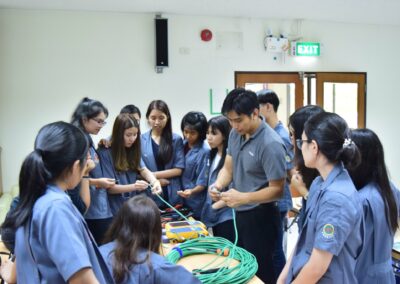Change Language: ภาษาไทย
Bachelor degrees program
Electronic physics
ภาษาไทย ภาคปกติ
ระยะเวลา: 4 ปี
จำนวนรับเข้า: 40 คน
คุณสมบัติผู้สมัครเข้าศึกษา:
- ผู้สมัครต้องเป็นผู้สำเร็จการศึกษาชั้นมัธยมศึกษาปีที่ 6 สายสามัญ กลุ่มสาระการเรียนรู้วิชาวิทยาศาสตร์ ฟิสิกส์ เคมี ชีวะ ต้องเรียนรายวิชาพื้นฐานและรายวิชาเพิ่มเติม รวมกันไม่น้อยกว่า 22 หน่วยกิต กลุ่มสาระการเรียนรู้คณิตศาสตร์ต้องเรียนรายวิชาพื้นฐานและรายวิชาเพิ่มเติม รวมกันไม่น้อยกว่า 12 หน่วยกิต
จำนวนหน่วยกิต:
- จำนวนหน่วยกิต รวมไม่น้อยกว่า 129 หน่วยกิต
- วิชาศึกษาทั่วไป 30 หน่วยกิต
- วิชาเฉพาะ ไม่น้อยกว่า 93 หน่วยกิต
- วิชาเลือกเสรี ไม่น้อยกว่า 6 หน่วยกิต
ค่าเล่าเรียน:
- ภาคการศึกษาละ 17,300 บาท (เหมาจ่าย)
สถานที่ศึกษา:
คณะวิทยาศาสตร์และเทคโนโลยี มหาวิทยาลัยธรรมศาสตร์ ศูนย์รังสิต
Contact




This program is the first and only electronic physics program in Thailand. It focuses on developing highly knowledgeable and highly competent graduates who are capable of producing research and innovations that can be applied to real-world situations. Focus is placed on the development of new sensor innovations to accommodate growth in all 10 new target industries (S-curve). Sensor innovations can be used to support practically every target industry such as the new automotive industry, smart electronics industry, robotics for industrial development, and comprehensive medical industry.
Program Description
For technologies, innovations and creativity, the government is aiming to develop 10 target industries (S-Curve). Five of these will expand upon existing capable industries, including the modern automotive industry, smart electronics industry, high-income tourism and health tourism industry, and agriculture and biotechnology and food processing industry. The remaining five will be future industries such as industrial robotics, airline and logistics, biofuel and biochemical, digital and comprehensive medical industries.
The electronic physics program recognizes the need to modify the economic structure to support the transition to Thailand 4.0. Thus, the new program was created as a bachelor degree program which focuses on producing highly knowledgeable and competent electronic physics graduates who can create research, innovations and inventions that can be applied in real situations. Accordingly, emphasis is placed on developing innovative sensor systems to support the growth of all 10 target industries. Clearly, the objective of this program is to meet the economic structure changes of Thailand in the effort to reduce dependence on foreign technology and to enhance the country’s competitiveness on the international level.
The program’s learning process emphasizes actual work training in operations and minor projects in interesting subjects such as basic computer programming for electronics, microcontroller systems, microcomputer connection techniques, optoelectronics, computer circuitry design, non-destructive test equipment design, electronic circuit analysis by computer, sensors and transducers, innovative sensor technologies, industrial control systems, and mechatronics.
Internships or Cooperative Education
Students will be able to take part in internships at leading organizations in the public and private sectors in the country and abroad that are part of the network of the Faculty of Science and Technology (internship commences in the summer semester of the third year and ends in the first semester of the fourth year).
Further Studies
Graduates in electronic physics will have the academic competence to pursue advanced studies domestically and abroad. They can pursue further studies in physics, engineering science or other related fields.
Target Occupations After Graduation
Product analysis engineer, production engineer, academic in government agency or state enterprise, teacher or instructor at a public or private academic institution, and free-lance work.
“I studied this program because of its unique name. No other university offers this program. The important thing about electronic physics is that it teaches us about the physics related to how circuits and other components of equipment work as well as how to apply that knowledge. Overall, I think it’s great.”


